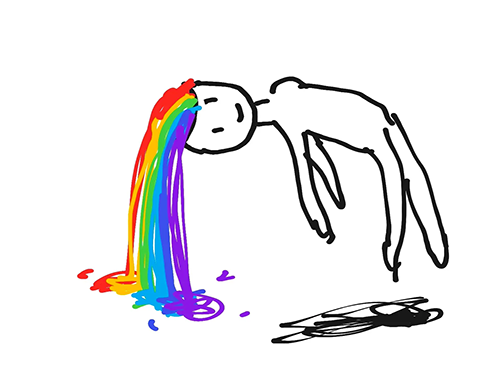I like visuals and similes to explain how I think. Extroverted intuition (Ne) is like an ever-expanding network. It looks like electricity, a nebula of thoughts with endless connections overlapping one another. I also see it spread like a firework, with sparks of insight and additional tangents or connection in the moment, referencing previous data points gathered in the past. So, it’s complicated. It’s messy, and it’s beautiful to witness and nurture.

Extroverted intuition is a sponge for information. Just like extroverted sensing, it takes in physical data and consolidates it for the future. It is less detailed than Se in general, and can take in the “gist” of a space, the theme, or something of a pattern if there is enough of a foundation to reference this data to. Ne is pattern recognition, so when a data point is related to some prior consumed data that makes a pattern, the ENFP may go off on tangents with storytelling, or changing their interests because their attention shifted immediately.
To observers, it seems the ENFP is scatterbrained and inconsistent. Well, to help someone understand (not condoning the behavior), an ENFP has a vast network of information to reference, and certain neural pathways that are of interest, meaning, they are stronger and more used. When a pattern of thinking is catalyzed from the external environment via conversation stimuli, that can activate a part of the ENFP’s brain to focus with intent. It may just be a different valuing of information to focus on. Dario Nardi even has brain scans to support how an ENFP has this “Christmas Tree” kind of brain where all parts light up and are used, so there may be less discrimination compared to other preferences. It’s not a good or bad thing, it’s just an observation and difference.
So to think like an ENFP, you are constantly seeking information because you thrive on novelty and pattern seeking. It is usually based on the human condition, and narratives. We love stories. We love living life spontaneously, and gathering data to test our hypotheses on humanity and ourselves. To do so means we are constantly watching people, we are watching interactions, slight facial expressions, past patterns and hypotheses that need confirmations. We use ourselves to test these hypotheses by observing, acting as stimuli for the environment, or asking people questions to see how they respond and seeing if it is authentic or a mask for something deeper.
Common themes of how we think and perceive information:
- What is my purpose?
- Is this just? Which groups or individuals suffer from this decision?
- Am I being authentic when I do this?
- Am I imposing my way of living on others?
- How can I express myself in a way that truly reflects who I am?
- What else can I learn about these important topics?
- Where can I go to experience novelty?
- Who can I talk to about the human condition?
- Where can I find interesting people and brains to explore?
- I feel misunderstood. Should I explain who I am, or is it worth it?
- Why don’t they understand me?
- Where do I belong?
- I don’t belong, but I don’t want to necessarily fit in.
- How can I make an impact in this world?
- I should write a song or story about this.
- I can imagine a life like this (starts on this path). Or maybe like this (changes path). Ohh this is also interesting (takes another path)… etc.
- I see the potential and possibilities of others. I wish people could do the same for me.
After we gather information, we sit and process. We consult with our values and authenticity (introverted feeling, Fi) to see if these actions we’ve participated in honor who we are, and how we want to be seen. If we are challenged with information that counters who we think we are, or what we think the world is/should be, we sit and feel. The processing is quiet and invisible. No one, not even us, can physically see how the information is being sorted in our minds and bodies. It’s introverted, but it happens, and we can feel it. Our bodies are physically and emotionally processing the information where we withdraw, get quiet, and seem distant to others.
To gather so much information, or to engage with stimulation has an emotional and physical toll on us. This is partly why many in our lives notice how ENFPs tend to disappear once in a while. It is a common pattern because we don’t usually assess our thresholds for over-stimulation well. When we are involved in something, we want to gather as much of the experience as possible. This is a double-edged sword because we also don’t always know when to come out of our introverted states, so we become lonely or withdraw even more.
Our extroverted intuition can kick in, imagining all these possibilities of how we perceive ourselves useless or unworthy of love. We’re pretty good at self-deprecation. So, to get out of these patterns takes practice, and a compassionate hand to pull us out of our funks. ENFPs must practice seeking care, asking for care, and allowing others in our lives during darkness. We are used to showing people parts of ourselves, not our whole selves, mostly because we’ve had to practice showing certain parts to feel accepted.
So we get out of our funks, and get back to gathering data through lived experiences and reading. Lots and lots of reading. (Some ENFPs may not relate, that’s okay!)
We are extroverted thinkers (Te) where it appears we don’t have an idea what we are talking about, but with enough listening, or getting our thoughts out there, a whole thought or story can form. This can be annoying/frustrating for people in our lives. Some ways to get ideas out without having to burden others is to :
- Make art: if it’s an emotional process without words, draw, doodle, dance, write a poem about it, or jot down any and every word or phrase even if it doesn’t truly “make sense” right now.
- Write in a journal: Energy needs to go somewhere. Writing helps move your thoughts and emotions, so you don’t feel stuck. Writing and reading your thoughts can help give insight into your own experience.
- Preface your talking/rambling: Lots of people need to know why you’re talking. It helps them know their role, since lots of people want to interject with solutions. If you don’t even know what the problem is because you’re an external thinker, people might interrupt before you’re able to sort your thoughts out loud. “I don’t know what I need yet, or what the problem is, so please just listen first so I can get a better idea of what’s bothering me.”
- Blog or vlog for a limited audience: Creating content for others can help shape your message. It can also help broaden your perspective when receiving comments. This process can make your thinking more efficient. (Of course, share with people you trust)
- Make lists and write stuff down (on paper or electronically): Many times our ideas reference something we have lingering, but they are not fully formed yet. Sometimes we can quickly explain the idea, but it could also take a while if we’re tapping into lots of information. So, to help us explain ourselves and to honor the patience and time of others, it can be useful to have lists related to our interests available. We can be better understood.
Our baby function, Introverted Sensing (Si) gives us a relationship with nostalgia, holding onto the past, and longing for things and lives we haven’t participated in. It may also be a hurdle for us to completely work through grief, where we tend to hold onto things, perhaps for a lifetime. We may repeat our past several times where we haven’t learned the life lessons, our Ne (extroverted intuition) seeps in to make us think the outcome could be different, or it’s simply comfortable living with a predictable outcome. We may self sabotage for the sake of comfort. There is potential for clashing with being comfortable with the status quo.
I also think (Introverted Sensing, Si) that’s a reason why we like cutesy things and toys. We honor our childlike selves, and attempt to nurture them through living playfully and authentically. This has push-back from society in general, so it can be a vulnerable space to be in.
An observation on having extroverted intuition as a lead cognitive function and how it manifests relates to embracing all information.
- We tend to accept all parts of an entity or concept, which confuses many people.
- We are walking contradictions and people may see us as two-faced or confusing.
- We like cute and morbid things. We enjoy lightheartedness, depth, curiosity, and silliness in one conversation.
- We accept people for their darkness and light, because humans are complex. We wish for others to accept us this way as well.
- We see endless possibilities, which means there is no one truth. All opinions are important, and we are open to hearing them. (Unless it’s about a core value, then nope! lol)
- If it’s a topic that’s not too dear to us, we can be swayed to embraced an opposing perspective with enough information. We are open to all information and to understand.
- We take a long time to make decisions because we have a difficult time weighing all the information. We take in too much information with “what if” scenarios.
- We live and try on different “hats” in life and consider them all authentic versions of who we are. Others may disagree, but we honor these possible versions of who we are and can be.
Many people wonder why we can’t learn from others. It makes us look stubborn and immature. I think it’s mainly a difference in preference. Some of us like to live for adrenaline rushes, and stories to write. This need for lived experience and information also tends to make ENFPs late bloomers. We just don’t seem to “adult” properly in the eyes of the greater culture. It’s not a bad thing, but sometimes people in our lives tend to demonize how we live or think. Try not to take it to heart. Personally, it happens to me and it does hurt. I try my best to find community and acceptance from those who understand there is no one way to live life well.
Side note: It’s amusing how ENFPs get ridiculed for being childlike and scattered, and YET countless movies and animations cast ENFP archetypes as the persona for viewers to escape from their uninteresting lives.
We are champions for a reason. We remind others how essential it is to be playful and honor our authentic selves, to fight and live for a cause greater than yourself. We see the potentials and genuine gifts and motivations of others. We instill optimism and joy to see awe in the world around us. Some people may think it’s too much. Well, they can learn to instill awe and playfulness in their lives, and we can learn to be more “responsible” and less scattered. It isn’t an all-or-nothing thing, but sometimes people like to externalize their discomforts of their own lives onto others. Be mindful of this.
Seeking to understand how other people think is a great step towards cultivating compassion and patience for others. Great question.
 七宗罪心理
七宗罪心理













